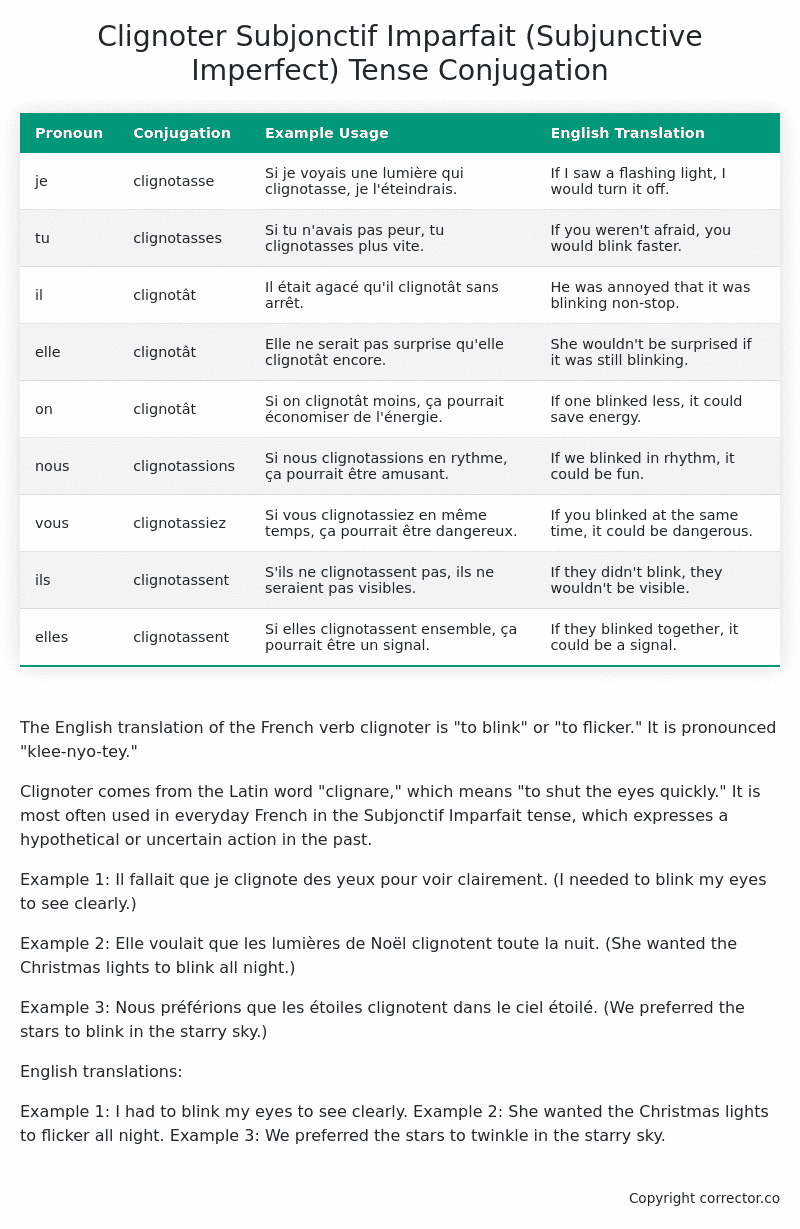Subjonctif Imparfait (Subjunctive Imperfect) Tense Conjugation of the French Verb clignoter
Introduction to the verb clignoter
The English translation of the French verb clignoter is “to blink” or “to flicker.” It is pronounced “klee-nyo-tey.”
Clignoter comes from the Latin word “clignare,” which means “to shut the eyes quickly.” It is most often used in everyday French in the Subjonctif Imparfait tense, which expresses a hypothetical or uncertain action in the past.
Example 1: Il fallait que je clignote des yeux pour voir clairement. (I needed to blink my eyes to see clearly.)
Example 2: Elle voulait que les lumières de Noël clignotent toute la nuit. (She wanted the Christmas lights to blink all night.)
Example 3: Nous préférions que les étoiles clignotent dans le ciel étoilé. (We preferred the stars to blink in the starry sky.)
English translations:
Example 1: I had to blink my eyes to see clearly.
Example 2: She wanted the Christmas lights to flicker all night.
Example 3: We preferred the stars to twinkle in the starry sky.
Table of the Subjonctif Imparfait (Subjunctive Imperfect) Tense Conjugation of clignoter
| Pronoun | Conjugation | Example Usage | English Translation |
|---|---|---|---|
| je | clignotasse | Si je voyais une lumière qui clignotasse, je l’éteindrais. | If I saw a flashing light, I would turn it off. |
| tu | clignotasses | Si tu n’avais pas peur, tu clignotasses plus vite. | If you weren’t afraid, you would blink faster. |
| il | clignotât | Il était agacé qu’il clignotât sans arrêt. | He was annoyed that it was blinking non-stop. |
| elle | clignotât | Elle ne serait pas surprise qu’elle clignotât encore. | She wouldn’t be surprised if it was still blinking. |
| on | clignotât | Si on clignotât moins, ça pourrait économiser de l’énergie. | If one blinked less, it could save energy. |
| nous | clignotassions | Si nous clignotassions en rythme, ça pourrait être amusant. | If we blinked in rhythm, it could be fun. |
| vous | clignotassiez | Si vous clignotassiez en même temps, ça pourrait être dangereux. | If you blinked at the same time, it could be dangerous. |
| ils | clignotassent | S’ils ne clignotassent pas, ils ne seraient pas visibles. | If they didn’t blink, they wouldn’t be visible. |
| elles | clignotassent | Si elles clignotassent ensemble, ça pourrait être un signal. | If they blinked together, it could be a signal. |
Other Conjugations for Clignoter.
Le Present (Present Tense) Conjugation of the French Verb clignoter
Imparfait (Imperfect) Tense Conjugation of the French Verb clignoter
Passé Simple (Simple Past) Tense Conjugation of the French Verb clignoter
Passé Composé (Present Perfect) Tense Conjugation of the French Verb clignoter
Futur Simple (Simple Future) Tense Conjugation of the French Verb clignoter
Futur Proche (Near Future) Tense Conjugation of the French Verb clignoter
Plus-que-parfait (Pluperfect) Tense Conjugation of the French Verb clignoter
Passé Antérieur (Past Anterior) Tense Conjugation of the French Verb clignoter
Futur Antérieur (Future Anterior) Tense Conjugation of the French Verb clignoter
Subjonctif Présent (Subjunctive Present) Tense Conjugation of the French Verb clignoter
Subjonctif Passé (Subjunctive Past) Tense Conjugation of the French Verb clignoter
Subjonctif Imparfait (Subjunctive Imperfect) Tense Conjugation of the French Verb clignoter (this article)
Subjonctif Plus-que-parfait (Subjunctive Pluperfect) Tense Conjugation of the French Verb clignoter
Conditionnel Présent (Conditional Present) Tense Conjugation of the French Verb clignoter
Conditionnel Passé (Conditional Past) Tense Conjugation of the French Verb clignoter
L’impératif Présent (Imperative Present) Tense Conjugation of the French Verb clignoter
L’infinitif Présent (Infinitive Present) Tense Conjugation of the French Verb clignoter
Struggling with French verbs or the language in general? Why not use our free French Grammar Checker – no registration required!
Get a FREE Download Study Sheet of this Conjugation 🔥
Simply right click the image below, click “save image” and get your free reference for the clignoter Subjonctif Imparfait tense conjugation!

Clignoter – About the French Subjonctif Imparfait (Subjunctive Imperfect) Tense
Formation
Common Everyday Usage Patterns
Interactions with Other Tenses
Subjonctif Présent
Indicatif Passé Composé
Conditional
Conditional Perfect
Summary
I hope you enjoyed this article on the verb clignoter. Still in a learning mood? Check out another TOTALLY random French verb conjugation!


